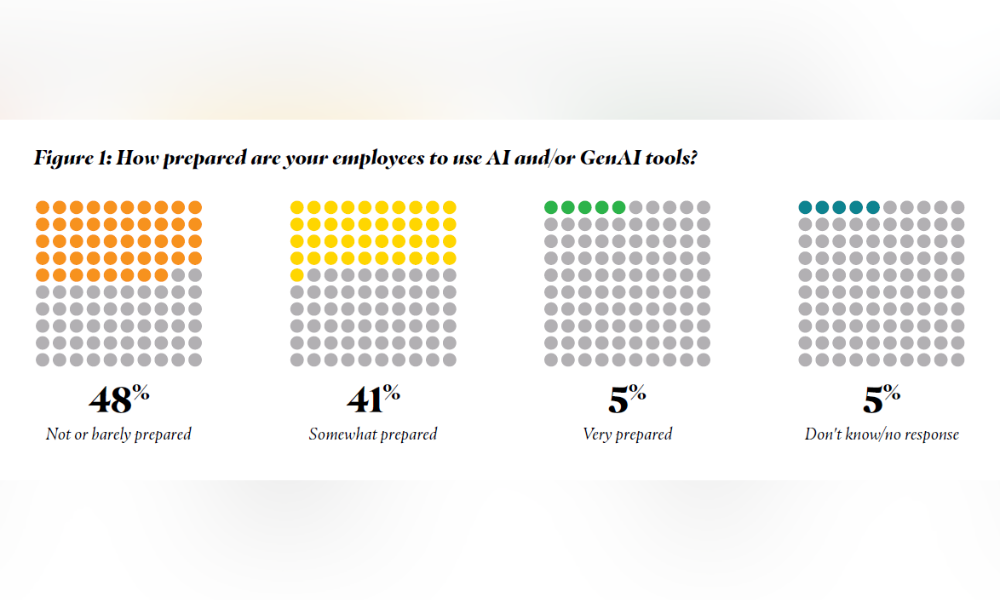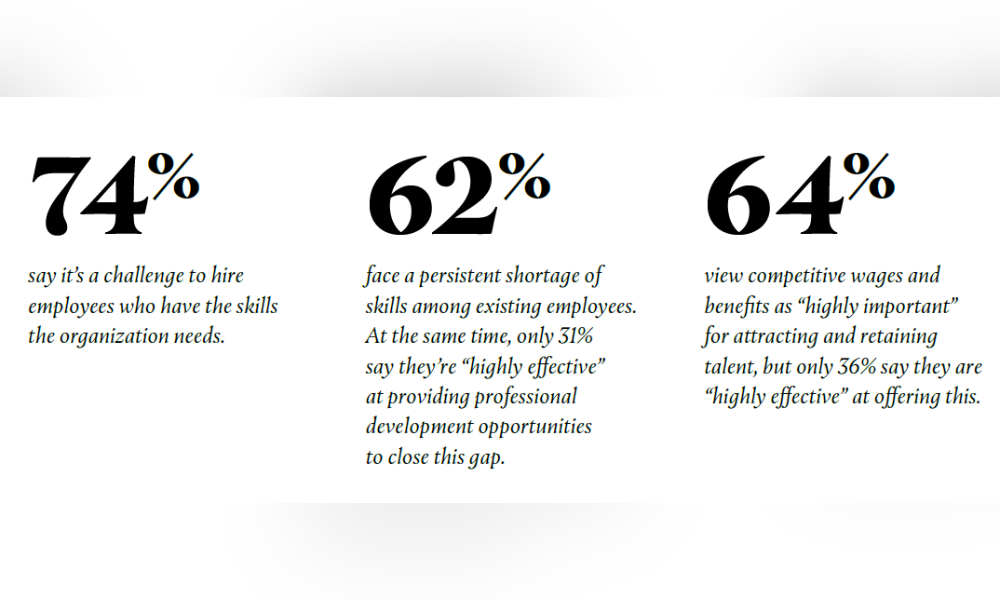'Organizations are lagging in AI adoption due in large part to the difficulties they face in hiring the talent they need to deploy and leverage AI,' says Deloitte

While most Canadian employers say they like to stay up to date with new technology, many are falling behind when it comes to adopting generative artificial intelligence (GenAI), finds a report.
Overall, 90 per cent of employers say that adapting to technological change is a moderate to high priority. However, 56 per cent don’t use AI and aren’t in the process of adopting it, reports Deloitte.
Just 15 per cent of employers have workers currently using AI at work.
It seems AI adoption is far from being the top item on employers’ to-do lists: Just 19 per cent plan to adopt it in the next few years and only five per cent say their workers are “very prepared” to use AI.
Nearly half (48 per cent) feel their employees are barely or not at all prepared to use AI or GenAI.

Source: Deloitte
“Failing to address these challenges could result in missed opportunities for AI-enabled economic growth and productivity gains. And these opportunities are significant: by one estimate, harnessing GenAI alone could result in a remarkable 7% increase in global GDP – that’s nearly US$7 trillion – as well as a 1.5-percentage-point increase in productivity growth over a 10-year period,” says the Deloitte report.
Over a quarter (27 per cent) of companies have banned the use of GenAI, at least temporarily, according to a previous Cisco report.
Labour shortages related to AI
One thing that contributes to the slow AI adoption is Canadian employers’ struggles when it comes to finding the talent that they need, according to Deloitte’s report based on a survey of over 800 managers and executives across Canada from June 16 to 30, 2023; eight roundtables and one flagship symposium with CEOs and directors from across the country; and two workshops with external specialists.
Nearly three-quarters (74 per cent) of employers say it is a challenge to hire employees who have the skills that their company needs. On top of that, 62 per cent face a persistent shortage of skills among existing employees.
“Canadian organizations are lagging in AI adoption due in large part to the difficulties they face in hiring the talent they need to deploy and leverage AI,” says Deloitte. “They also struggle to commercialize AI, which poses particular challenges for startups and scale-ups, many of which find it difficult to grow and remain in Canada.”
Also, while 64 per cent of employers view competitive wages and benefits as “highly important” for attracting and retaining talent, only 36 per cent say they are “highly effective” at offering this.
“If this disruption in the workforce isn’t addressed soon, widespread and prolonged job vacancies and skills shortages will continue to negatively impact business innovation, growth, and productivity. This is hurting Canada’s overall competitiveness and growth potential,” says Deloitte.

Source: Deloitte
Upskilling needed to address skills gap
Employers are also falling short when it comes to providing upskilling opportunities, as only 31 per cent say they are “highly effective” at providing professional development opportunities to address the skills gap.
“If we invest in reskilling the workforce, we can bridge skills gaps and enhance one of our country’s signature competitive advantages: a world-class, highly educated labour force, one that consistently places Canada at the top of G7 countries for share of working-age people with a college or university credential (57.5 per cent).”
At the international level, reskilled workforces could contribute up to US$6.5 trillion to the global GDP and create an estimated 5.3 million new jobs by 2030, says Deloitte.
“For Canada, navigating the evolving workforce is an opportunity to address its persistently lagging labour productivity, which stood at just 18th among Organisation for Economic Co-operation and Development (OECD) countries in 2023.”
The federal government is investing $2.4 billion to support AI use in Canada. This includes an investment in made-in-Canada compute infrastructure. These are hardware and software systems that are specifically designed to support AI technology – such as machine learning and deep learning research.
Shift to skills-based workforce strategy
Here’s how employers can find the talent with the right AI skills, according to Deloiite:
- Seek applicants who have an aptitude for adaptive learning and a commitment to tackling hard challenges instead of focusing on those with a narrow set of skills, experiences, and educational paths.
- Create a strong employer brand to attract top talent.
- Work with universities to both access and develop talent.
Deloitte also notes that the federal government should “invest differently in the growth and success of Canadian startups and scale-ups”.
The Canadian government should modernize its approach to foreign direct investment (FDI) “to reflect the intangibles economy”.
“The strategy should prioritize building a domestic market of first customers, including governments, to support the development of Canada-based high-growth startups and scale-ups. Increasing the availability of domestic capital would help these firms focus on their work,” Deloitte says.
Under Budget 2024, Ottawa is investing $50 million over four years to provide skills training for workers in sectors disrupted by AI.
To prepare workers for AI use, Deloitte suggests that employers do the following:
- Shift the workforce strategy to be skills-based rather than role-centred to enhance the organization’s agility and adaptability to AI advancements.
- Undertake a comprehensive assessment of the existing skills as well as those that will be needed, now and in the future. This can be done by developing an inventory of skills and identifying which are in high demand but short supply.
- Once there is a clear sense of which skills need to be developed, determine an upskilling approach.
“AI-driven adaptive learning, which uses continual assessments and algorithmic adjustments, tailors the learning process to each employee’s unique needs and learning speeds. Hosted on digital platforms, opportunity marketplaces empower employees to locate internal projects and roles that allow them to learn new skills on the job and find opportunities to shape their own career trajectories,” says Deloitte.




